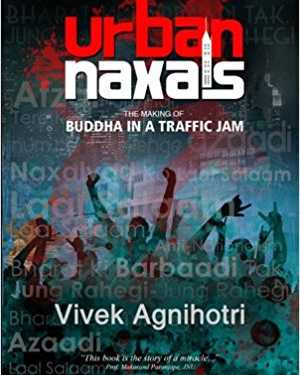While numerous books are launched and sold in millions every year, there are very few which can claim to have touched upon delicate issues. A new book on Naxalism, which focuses on the urban Naxal problem in India, is one such book that tries to tap into a highly controversial topic. The book “ Urban Naxals ” written by filmmaker and author Vivek Agnihotri is one such book, the launch of which took place in Bharat Vidya Bhavan yesterday. The launch of the book was attended by minister Smriti Irani and other great thinkers on the Naxal crisis. The book by Vivek Agnihotri focuses on the Naxals living amongst us in cities in the capitalist world they so passionately deride. Eminent academicians and thinkers whose job is to influence young minds into joining the Naxal cause also carry out the task of managing finances and other assistance for their violent counterparts in the remote areas of Jharkhand and Chhattisgarh. The speakers at the book launch focused on the relevant topics and much more in their bid to explain the depth of the urban Naxal problem in India.
An article published earlier on our website remains relevant and will continue to be so until the Naxals are completely wiped out from Indian soil. The article is an attempt to explain how these parasites that are masquerading as victims function, and also stresses on how important it is for the government to realize that the Naxal issue can be tackled by dealing with urban Naxals first. Many literary scholars from top institutions like Jawaharlal Nehru University, Delhi University amongst others have been accused of being active overground workers. The surrender of a Naxal operative last year, Podiyam Panda, opened the doors to the cluster of over ground Maoist-sympathizers, supporters and ideologues.
DU Professor of Sociology Nandini Sundar, wife of Siddharth Varadarajan, the founder of the independent journalism portal ‘The Wire’, was accused by Panda of being an over ground Naxal supporter. She isn’t the only one though; many writers, college professors and journalists occupy positions explicitly so that they can manipulate public opinion in the favour of their comrades. This activity which is carried out right under the governments’ nose is far more dangerous as it influences people from growing cities towards anti-India activities.
The massive support these people get from the young minds of our society should be a cause of grave concern for the government. The elite positions these Naxal sympathisers hold gives them the liberty of engaging in anti-establishment work within the democratic setup of our nation. Vivek Agnihotri’s book is a good start, and more of such literature needs to be published in order to expose the ongoing problems in our society. The Naxals can survive in the villages and forests only because of the support they get from their urban elite class brethren. ‘Urban Naxals’ and ‘Buddha in a traffic jam’, a book and a movie written and made respectively by Vivek Agnihotri points towards the root cause of the Naxal crisis in India. A large part of the blame for India’s lack of development in villages is borne by the Naxals, and it will continue to do so if left unchecked. Indian government must realize the need to curtail the liberty given to Naxal sympathizers under the pretext of freedom of speech.
Makarand Paranjape, Sudhir Chaudhary and several other speakers at the book launch event pointed towards how the phenomenon of urban Naxalism is consistently attacking the system from underneath. Urban naxals humanise these terrorists, and legitimise their deluded cause by sympathising with them. Too much time has already been lost; a swift and decisive course of action must be taken to tackle this issue. Books and movies like these must be welcomed as they highlight the evil side of the so called social elites who are in reality nothing less than parasites for our nation.



























